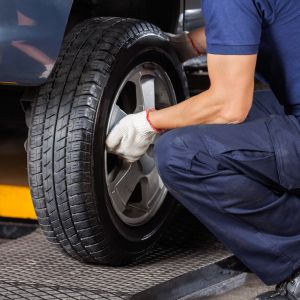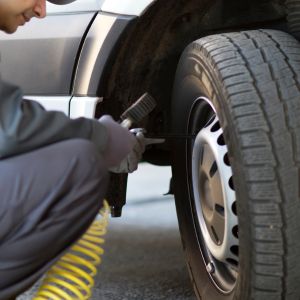When it comes to the safety and functionality of a vehicle, one of the most crucial components is the tyres. They are responsible for providing traction, stability, and overall control while driving. As a result, it is important to regularly check the condition of your tyres to ensure they are in top shape. However, despite proper maintenance, many drivers have experienced unexpected tyre deflation without an apparent puncture.
This phenomenon has sparked the question: can car tyres deflate without a puncture? While punctures are a common cause of tyre deflation, there are other factors that can lead to a loss of air pressure. In this article, we will explore the possibility of tyre deflation without a puncture and discuss the potential causes behind this issue. By understanding the various factors at play, drivers can take the necessary precautions to ensure their tyres stay properly inflated, thereby providing a safer and smoother driving experience.
Understanding common causes of deflation

Deflation, in the context of car tyres, refers to a decrease in air pressure within the tyre, leading to a loss of inflation. While a puncture is often the primary culprit for deflation, it is not the only possible cause. Understanding the common causes of deflation is essential for car owners to ensure proper maintenance and safe driving. One possible cause is a faulty valve stem, which can lead to gradual air leakage.
Another factor could be a damaged or faulty seal between the tyre and the wheel rim, causing air to escape over time. Additionally, poor wheel alignment or suspension issues can put uneven pressure on the tyres, leading to deflation. Regular inspection and addressing these potential causes can help car owners prevent unexpected deflation and maintain optimal tyre performance.
Importance of regular tire maintenance

Regular tire maintenance is of utmost importance for car owners to ensure optimal performance and safety on the road. While it may seem convenient to dismiss tire maintenance as an unnecessary chore, neglecting it can have serious consequences. Proper tire inflation is crucial for maintaining traction, stability, and fuel efficiency. Without regular maintenance, tires can lose air pressure gradually, leading to decreased performance and an increased risk of accidents.
Additionally, uneven tire wear can occur, reducing the lifespan of the tires and requiring premature replacements. By regularly checking tire pressure, inspecting for signs of damage, and rotating tires as recommended, car owners can prolong the life of their tires, improve overall vehicle performance, and ultimately ensure a smooth and safe driving experience.
Signs of a slow leak
While it is commonly believed that car tyres can only deflate due to a puncture, it is important to recognize that a slow leak can occur without any visible signs of damage. This can be attributed to various factors such as valve stem issues, bead leaks, or even small punctures that may not be immediately noticeable. As a result, it is crucial for car owners to be vigilant and pay attention to signs indicating a slow leak.
These signs may include a gradual decrease in tire pressure over time, a noticeable difference in the handling and performance of the vehicle, or the need to frequently re-inflate tires. Ignoring these signs can lead to reduced fuel efficiency, uneven tire wear, and even a potential blowout, posing significant risks on the road. Therefore, regular inspection and maintenance of tyre pressure, as well as prompt identification and resolution of slow leaks, are essential to ensure the safety and longevity of your vehicle’s tires.
Potential damage to tire sidewalls
The sidewalls of car tires are susceptible to potential damage, which can compromise the overall integrity and performance of the tire. Factors such as hitting curbs, driving over potholes, or encountering debris on the road can cause sidewall damage. This damage may not always be immediately visible, but it can lead to serious consequences if left unaddressed.
Cracks, bulges, or cuts in the sidewall can weaken the tire structure, making it more susceptible to blowouts or sudden deflation. Additionally, sidewall damage can affect the tire’s ability to maintain proper air pressure, leading to reduced fuel efficiency and uneven wear. It is important for car owners to regularly inspect their tires for any signs of sidewall damage and seek professional assistance if any issues are detected. Taking proactive measures to address potential sidewall damage can help ensure a safe and reliable driving experience.
Seeking professional help when needed

In the event of encountering sidewall damage or experiencing sudden deflation in car tyres, it is crucial to seek professional help promptly. While punctures are often the most common cause of deflation, it is essential to recognize that tyres can deflate without a puncture as well. Issues such as valve stem leaks, bead leaks, or damage to the inner liner can also result in gradual or sudden loss of air pressure.
Attempting to diagnose and fix these complex issues without the necessary knowledge and tools can be challenging and potentially dangerous. Therefore, engaging the expertise of a qualified professional is highly recommended. Automotive professionals possess the necessary skills and specialized equipment to accurately identify the root cause of deflation and perform the required repairs or replacements. By seeking professional help in a timely manner, car owners can ensure the safety, performance, and longevity of their tyres, as well as maintain optimal driving conditions.
FAQs About car tyres deflate without a puncture
Is it possible for car tires to deflate without any visible punctures or damage?
Yes, it is possible for car tires to deflate without any visible punctures or damage. There are several reasons why this can occur. One common reason is a slow leak, where the air gradually escapes over time. This could be due to a faulty valve stem or a small puncture that is difficult to detect.
Another possibility is a bead leak, where the tire is not properly sealed against the rim. Additionally, temperature changes can cause fluctuations in tire pressure, leading to deflation. It is important to regularly monitor tire pressure and inspect for any signs of damage to prevent unexpected deflation.
What are some common reasons for car tires deflating without a puncture?
Some common reasons for car tires deflating without a puncture include valve stem issues, bead leaks, wheel damage, and temperature changes.
Can extreme temperature changes cause car tires to deflate without a puncture?
Yes, extreme temperature changes can cause car tires to deflate without a puncture. When temperatures fluctuate significantly, the air inside the tires can expand or contract, leading to changes in pressure.
In very hot weather, the air inside the tire can expand, increasing the pressure and potentially causing the tire to burst if it exceeds the maximum pressure limit. Conversely, in very cold weather, the air inside the tire can contract, leading to a decrease in pressure and resulting in deflation. It is important to regularly monitor tire pressure and adjust it as needed to ensure optimal performance and safety.
Conclusion
While it is possible for car tyres to deflate without a puncture, it is not a common occurrence. Factors such as changes in temperature, faulty valve stems, and improper inflation can all contribute to a sudden loss of air pressure in tyres. It is important for car owners to regularly check their tyre pressure and address any issues immediately to ensure safe and efficient driving. By staying vigilant and properly maintaining our tyres, we can prevent unexpected deflation and keep our vehicles running smoothly.

